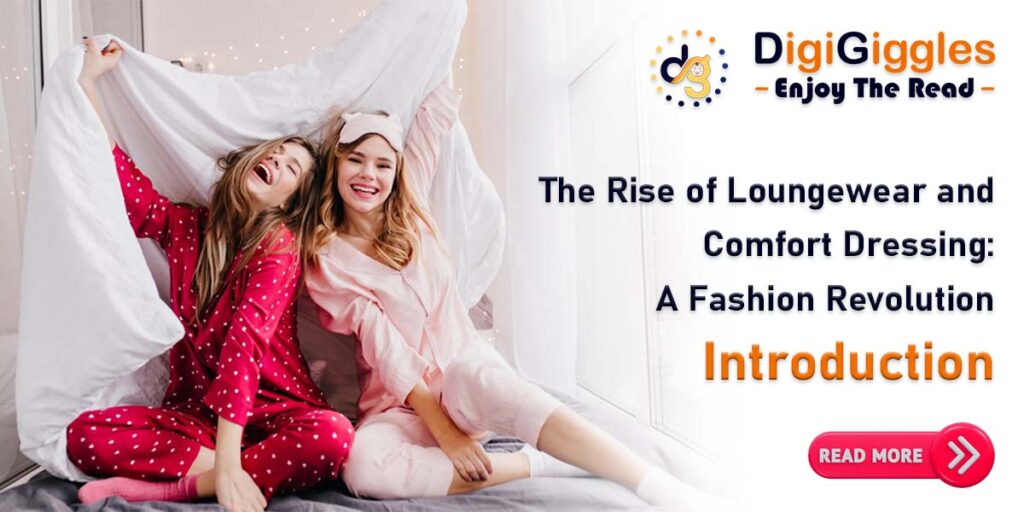
In recent years, a significant shift has occurred in the way we perceive and engage with fashion. The once clear boundaries between formal and casual attire have blurred, giving rise to a phenomenon known as “comfort dressing.” At the forefront of this revolution is the surge in the popularity of loungewear. In this blog post, we will explore the reasons behind this trend and its implications for our daily lives.
Embracing Comfort: The Lifestyle Shift
A New Way of Living
The transformation in our lifestyle, catalyzed by the advent of remote work and an increased emphasis on wellness, has played a pivotal role in the rise of comfort dressing. With more people working from home, the necessity for stiff, structured attire has diminished, paving the way for comfortable, relaxed clothing.
This shift represents more than just a sartorial change; it signifies a broader societal acknowledgment of the importance of holistic well-being. No longer confined to office cubicles, individuals are now embracing a lifestyle that prioritizes comfort and flexibility. This has led to a revolution in how we approach fashion, where comfort and style are no longer mutually exclusive.
The Pursuit of Wellness
In an era where self-care and well-being have taken center stage, comfort dressing aligns perfectly with this ethos. It allows individuals to prioritize comfort without compromising style, fostering a sense of balance between work and personal life. The ability to seamlessly transition from work to relaxation promotes a healthier work-life integration, reducing stress and enhancing overall contentment.
The Loungewear Revolution
Definition and Characteristics
Loungewear, once confined to the privacy of our homes, has evolved into a versatile fashion category. It encompasses a wide range of clothing designed for leisure and relaxation, including oversized sweaters, joggers, and soft, breathable fabrics. What sets loungewear apart is its emphasis on fabric that feels like a gentle embrace and designs that allow for unhindered movement.
The versatility of loungewear is one of its greatest strengths. It’s not limited to a specific demographic or occasion. Whether you’re lounging at home, going for a casual stroll, or even meeting friends for a laid-back gathering, there’s a loungewear ensemble for every occasion.
The Fashion Industry’s Response
Recognizing the growing demand for loungewear, many fashion houses and brands have pivoted their collections to cater to this trend. High-end designers and fast-fashion retailers alike now offer a wide array of stylish loungewear options, blurring the lines between traditional casual wear and comfortable dressing.
This democratization of loungewear speaks volumes about its widespread acceptance. It’s no longer relegated to niche markets; it’s a cornerstone of contemporary fashion, accessible to individuals from all walks of life. This shift in the industry’s focus reflects a fundamental change in consumer preferences, emphasizing comfort, versatility, and style.
The Psychology of Comfort Dressing
Enhancing Well-Being
Research suggests that the clothes we wear can have a profound impact on our psychological state. Comfortable clothing can evoke feelings of relaxation, security, and confidence, ultimately contributing to an improved sense of well-being. When we feel at ease in what we wear, we project a sense of inner tranquility, influencing not only our own mood but also the way others perceive us.
Empowerment through Expression
Comfort dressing allows individuals to express themselves authentically. It encourages personal style without the constraints of societal norms, empowering people to embrace their unique fashion sensibilities. Whether it’s through vibrant patterns, soothing pastels, or minimalist designs, comfort dressing provides a canvas for self-expression that resonates on a deeply personal level.
This newfound sense of empowerment through clothing is a testament to the transformative power of comfort dressing. It encourages individuals to break free from conventional fashion norms and cultivate a style that is uniquely their own.
Sustainability and Comfort Dressing
A Step Towards Conscious Consumption
The comfort dressing trend aligns seamlessly with the growing movement towards sustainable fashion. As individuals opt for versatile, high-quality loungewear pieces, they often invest in fewer, but more durable, items that stand the test of time. This shift away from disposable fashion not only reduces environmental impact but also encourages a more mindful approach to consumption.
Ethical Production Practices
Many brands that specialize in loungewear prioritize ethical and eco-conscious manufacturing processes. From using organic materials to implementing fair labor practices, these companies are leading the charge in creating a more sustainable fashion industry. By supporting such brands, consumers actively participate in a movement toward a fashion landscape that values both style and ethics.
As we navigate an ever-evolving world, our approach to fashion adapts accordingly. The rise of loungewear and comfort dressing signifies a profound shift towards prioritizing comfort, well-being, and individual expression. It encourages us to explore a more sustainable and mindful approach to our clothing choices. So, whether working from home or stepping out for a casual outing, remember that comfort dressing allows you to embrace style without sacrificing comfort.
In this era, where comfort reigns supreme, let us revel in this newfound freedom to express ourselves through clothing that not only looks good but feels good too. Comfort dressing is not just a trend; it’s a revolution that has redefined how we approach fashion, and it’s here to stay. Embrace it, not just as a style choice, but as a reflection of a lifestyle that values comfort, self-expression, and conscious consumption. By embracing comfort dressing, we not only elevate our sense of well-being but also contribute to a more sustainable and inclusive fashion industry.